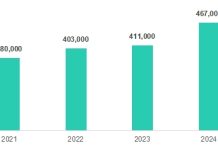HubSpot, the customer platform for scaling businesses, today announced the findings of a study conducted by Milieu Insight that explored the trends and innovations shaping the startup landscape in Southeast Asia and India.
Despite global economic challenges and a decline in private funding to its lowest levels in six years, the startup ecosystem in these regions remains resilient, demonstrating significant signs of maturity.
HubSpot’s new report reveals that on average, 53% of startups across the region found it easier to grow their businesses in the past year compared to previous years. Notably, 98% of regional startups now emphasize the importance of having a clear path to profitability.
This resilience is characterized by a notable dichotomy: while geographical expansion presents challenges, with 23% of startups finding it harder to enter new markets, customer acquisition and retention have become more manageable.
Although 18% mentioned that acquiring customers has become more challenging, more than half (55%) report improvements in customer acquisition and retention. Key challenges include increased competition (31%), stricter customer demands (31%), and access to capital (29%).
Laurence Butler, Global Senior Director, HubSpot for Startups, commented: “These signs of growing resilience are a testament to the region’s entrepreneurial spirit and adaptability. Modern startups leverage digital-first approaches and technologies like CRM platforms to swiftly adapt to volatile market conditions.
Recognizing the critical importance of profitability, startups are focusing on core markets and building robust customer relationships for long-term sustainability.”
Potential for Technology-Augmented Growth
The survey findings reveal that startups in the region are leveraging technology to drive growth. Almost all (99%) startups use at least one CRM tool, with 81% satisfied with their tech stack. CRM platforms consolidate customer data, enabling brands to accurately track and measure the effectiveness of their customer engagement efforts.
Consequently, 71% of startups feel they have sufficient data to identify new growth opportunities.
However, there is a disparity between countries. More than a third of startups (38%) in the Philippines reported insufficient data on their business prospects and customer journey, with only 58% satisfied with their tech stack, the lowest among surveyed countries.
Nearly half (48%) find it more difficult to grow their companies, almost double the regional average of 25%.
AI on the Rise but Talent Still in Short Supply
AI is transforming the startup landscape in Southeast Asia and India, seen as pivotal in future strategies for automating tasks and creating roles requiring advanced skill sets. However, talent acquisition remains challenging, especially for roles in marketing (46%), customer success (40%), sales and business development (38%), AI and machine learning (35%), data analytics (33%), and software engineering (32%).
The talent landscape varies across countries:
– In Singapore, significant challenges include lack of diversity (41%) and specialized technical skills (37%).
– In India, issues include limited startup experience (49%), misaligned remote work expectations (49%), general talent shortage (48%), lack of soft skills (47%), high turnover rates (41%), and cost (50%).
– Indonesia mirrors many of India’s trends, though challenges related to soft skills, remote work expectations, and turnover rates are less pronounced.
Startups must rethink talent strategies, investing in upskilling and reskilling employees, leveraging remote work, and fostering a culture of diversity and continuous learning.
The Role of AI in Driving Growth
A majority of startups (98%) agree that AI is crucial to their future strategy, particularly in India (73%) and Indonesia (63%). AI offers opportunities to accelerate time to market (32%), enhance product delivery (30%), and compete with larger competitors (30%).
“AI is viewed as the single largest economic opportunity since the start of the internet, and data is the currency of AI,” explained Butler. “Startups in the region are well-positioned to leverage AI, identifying gaps in their business models, better anticipating customer needs, and delivering highly personalized customer experiences.”
These findings are based on responses from 600 startup founders and decision-makers across Singapore, Indonesia, the Philippines, and India, collected from February to March 2024.















